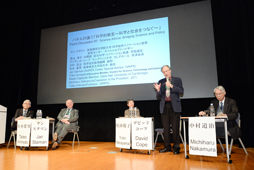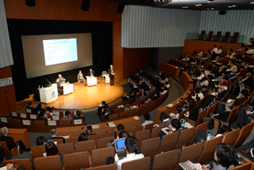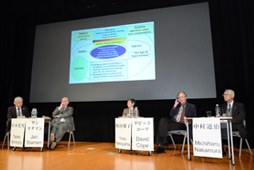前半
Part1
後半
Part2
How can scientists and citizens take part in science that is more open to public and democratic driven by the spread of information technology and globalization, and how do they develop their own activity? We discussed the current state and issues.
はじめに、科学技術振興機構(JST)研究開発戦略センターの倉持隆雄センター長代理より、現状の科学技術と社会の関係性に関する分析と話題提起がなされました。
First, Mr. Takao Kuramochi, Deputy Director of Japan Science and Technology Agency (JST), Center for Research and Development Strategy, presented the analysis regarding the relationship between current science and technology and the society.
セッション前半では、「適切な政策判断のための科学的助言」について議論が交わされました。パネリストとして、政策研究大学院大学科学技術イノベーション政策研究センタースペシャルアドバイザーのヤン・スタマン氏、内閣府総合科学技術・イノベーション会議議員常勤議員の原山優子氏、ケンブリッジ大学クレアホール終身会員のデビッド・コープ氏、科学技術振興機構顧問の中村道治氏、モデレーターとして政策研究大学院大学教授の有本建男氏が登壇しました。
In the first half of the session, we discussed "scientific advice for appropriate policymaking." Presenters included Mr. Jan Staman, Special Advisor, SciREX Center, National Graduate Institute for Policy Studies, Ms. Yuko Harayama, an Executive Member, Council for Science, Technology and Innovation, Mr. David Cope, a Fellow, Clare Hall, Cambridge University, and Mr. Michiharu Nakamura, Counselor to the President, Japan Science and Technology Agency, and as a moderator, Prof. Tateo Arimoto, Professor, National Graduate Institute for Policy Studies.

はじめに有本氏は、近代科学の発展の流れにより社会が大きく変化し、政治と科学の関係も新しい時代を迎えている、と議論の口火を切り、パネリストに数分ずつのスピーチを促しました。
Prof. Arimoto started the discussion by addressing the development of modern science has changed the society drastically, and the relationship between politics and science has been creating a new era. Then he asked each presenter to give short presentations.
まずスタマン氏が、「助言者がすべきこと、してはいけないこと」と題してスピーチしました。助言者には重い責任を負う覚悟、政治家の立場の理解、助言のあともつながりを持つこと、自分の知らない世界に入る覚悟、その上で自分の誠実さを押し通すこと、行動規範を守ることが必要だと訴えました。
First, Mr. Staman gave a presentation titled "What an advisor should and shouldn't". He said that an advisor must be ready to take a grave responsibility, understand the positions of politicians, keep contacting them after advising, prepare to take a step into the world you never knew, stay honest, and behave according to a code of conduct.
原山氏はまず、「現在は科学技術政策に限らず、一般の社会政策について、科学的根拠に基づく助言を求められる。助言そのものの対象の層が変わってきている」と述べました。そして、個人が科学的助言を行うアメリカやイギリスの例と、組織が行う日本やタイの例を挙げ、各国が試行錯誤している現状を伝えました。その上で、科学的助言者はどこまで言及することが望まれていて、どこまで権限があり、何を軸として判断すべきなのか、と問題を提起しました。
Ms. Harayama said, “Nowadays, policymakers reach us for advice from scientific facts not just for policies on science and technology, but also for general social policies. The target subject that they seek advice has shifted." She presented that every country was going through trial and error and shared examples of the United States and the United Kingdom where individuals give advice as well as Japan and Thailand where organizations do. Then she posed a question how much scientific advice we should give, how much authority we would have, and how we should make such judgment.
コープ氏は、表には出てこないが必要不可欠である科学的助言者を「歌舞伎の黒子」に例え、科学的助言者には責任と信頼が必要だと述べました。
Mr. Cope compared necessary, yet unseen scientific advisors to "Kuroko” in Kabuki since they must have responsibilities and trust.
中村氏は、「ファンディング(資金援助)」を政治と科学の結節点に位置付けたのち、相手に役立つ提言の重要さを強調しました。そのために、科学技術コミュニティー内部で、平素からあらゆる世代、分野の意見をまとめておくこと、有効な助言をするためのツールや仕組み、そして国際的視点に基づいて助言をすることの必要性を訴えました。
Mr. Nakamura mentioned that funding would be the node to link politics and science, and it is importance to give helpful advice. It is also important to have a shared view within science and technology communities based on opinions from various generations and fields and to be prepared to give advice using the tools, frameworks, and global perspectives.
有本氏は、政治と科学の中にもさまざまな立場があり、自分のポジショニングをはっきりすることの重要性を説いたのち、度々登場した「信頼」というキーワードについて、スタマン氏とコープ氏に発言を求めたところ、2人共「信頼というのはAll or Nothingだ」と強調しました。
Prof. Arimoto explained the importance of one's position out of various positions within the world of politics and science. He then asked Mr. Staman and Mr. Cope to elaborate the frequently used keyword "trust." They both emphasized, "trust is all or nothing."

ここで会場から「人数が多いと合意形成に時間が掛かるが、助言者の人数の世界的な潮流はどちらに向いているのか」、そして「立場が違う者にアドバイスする際、科学者同士が調整する必要はあるのか」という質問が寄せられました。
There were two questions from the audience: "It takes a while to reach a consensus if there are many people in a decision-making body, but what is a global trend regarding the appropriate number of advisors?" Another question was: "Are scientists required to discuss with each other when giving advice to policymakers in different positions?”
1つ目の質問に対し、スタマン氏は複数の人による意見の合意よりも、良い意見が議論を喚起することが重要だと述べました。原山氏は、科学的助言者の仕事は意思決定そのものでなく、中身の議論の整理だと述べました。2つ目の質問に対しては、コープ氏は政府、議会、司法の三者は立場に壁があるものの、その助言者同士は日常的に調整すべきだと述べました。
Mr. Staman answered the first question that it was more important to facilitate a discussion by giving a good suggestion than to reach a consensus amongst multiple people. Ms. Harayama said a scientific advisor's job was not decision-making but organizing discussion points. Mr. Cope answered the second question that advisors should regularly discuss with each other even though there is a divide between legislative, executive and judicial.
最後に、原山氏は「政治に対する科学的助言の原点は民主主義に関わる問題であり、究極的には国民全員、あるいは世界に対しての助言だという根本的な心得を忘れてはならない」と述べ、コープ氏から「今日の議論を忘れずに、継続することが大事だ」という意見が出ました。有本氏は今回の議論を踏まえて来年は、より発展した議論をすることを強く望みながら議論を締めくくりました。
Lastly, Ms. Harayama said, "Scientific advice for policymaking is directly connected to democracy, and we must not forget the basic idea that ultimately the advice would be for every citizen in the country or the world.” Mr. Cope added, "We shouldn't forget the discussion we had today, and we need to discuss." Prof. Arimoto concluded the discussion hoping to achieve a further developed discussion next year.

セッション後半では、「オープンサイエンス」について議論が交わされました。パネリストとして、ユーロサイエンス事務局長のピーター・ティンデマンス氏、韓国科学創意振興財団理事長のキム・スンファン氏、トレント大学教授のマッシミアーノ・ブッキ氏、南アフリカ共和国大使館特命全権大使のモハウ・ペコ氏、大阪大学理事・副学長の小林傳司氏、モデレーターとして科学技術振興機構上席フェローの大竹暁氏が登壇しました。
In the latter half of the session, we discussed "Open Science." As presenters, Mr. Peter Tindemans, the Secretary General of EuroScience, Mr. Kim Seung-hwan, the President of Korea Foundation for the advancement of Science and Creativity, Prof. Massimiano Bucchi, Professor of University of Trento, Ms. Mohau, Pheko, Ambassador Extraordinary and Plenipotentiary of Embassy of the Republic of South Africa in Japan, and Mr. Tadashi Kobayashi, Director and Vice President of Osaka University, and as the moderator, Mr. Satoru Ohtake, Principal Fellow at Japan Science and Technology Agency were on stage.
はじめに大竹氏が、ヨーロッパで起こった「オープンサイエンス」という概念を紹介しました。論文やデータへのアクセスが一般市民にも可能となっていることをはじめ、科学全体が社会に対して「オープン」になってきています。その中で科学者や科学コミュニティー、社会はどう変わっていくのか、どう考えるべきか、と問題を提起しました。
First, Mr. Ohtake introduced a concept called "Open Science" originated from Europe. Recently, the entire scientist community has become increasingly "open" to the society, like allowing civilians to access to essays and data. He asked how scientists, the scientific community, and the society should change and should think in such context.
ティンデマンス氏は、まず、オープンサイエンスという方向性は正しいとした上で、現在までの進捗と問題点を紹介しました。市民が彗星観察などの研究に参加することは良いことだと述べ、オープンデータに関しては広く継続すべきだが、プライバシーやセキュリティーの問題が浮上する可能性を示唆しました。さらに、研究の詳細を広く市民に伝えることの難しさを説きました。
Mr. Tindemans agreed with the idea of Open Science and then introduced the progress and problems up to date. While he believed that citizens joining studies such as comet observation would be a good thing, and open data initiatives should be continued, some privacy and security issues might occur. Furthermore, he explained the difficulty of conveying the details of studies to citizens.
キム氏は、科学技術の全ての分野について開かれた状況を目指すのは難しいという認識を示しました。次に、医療分野からオープンサイエンスが広がり、政府もオープン化を推進しようとしている韓国の現状を伝えました。韓国では一般市民の社会においてオープンサイエンスの認識が高まっているそうです。
Mr. Kim suggested it would be difficult to disclose every field in every scientific technology. Then, he shared the current situation in Korea where Open Science developed from the medical field to the government. Open Science has increasingly gotten the recognition in the general society in Korea.
ペコ氏は、オープンサイエンスが地球全体における科学の生産と分配を適切な方向に是正し、革新と繁栄のために富の分配を改められるのか、という疑問を投げ掛けました。次に、南半球で研究用の大型電波望遠鏡を建設するプロジェクトを紹介し、その運用、共用にオープンサイエンスの考え方が合うか、という話題を提起しました。
On the other hand, Ms. Pheko wondered whether Open Science could correct creation and distribution of science in the entire world, and redistribute wealth for innovation and prosperity. Then, she introduced a project to build a massive radio telescope for scientific purpose in the southern hemisphere and asked if its operation and sharing would be considered Open Science.
ブッキ氏は、科学技術社会論の視点から、銀河の画像を分類して科学者を援助するプロジェクト「Galaxy Zoo」や、タンパク質構造予測ゲーム「Foldit」といった例を挙げ、オープンサイエンスに関心を持つ市民の側にもさまざまな形の参加の仕方があることを紹介しました。一方で、科学者側のオープンサイエンスへの態度もまたさまざまであることを、研究結果を交えて紹介しました。
Prof. Bucchi, from scientific technology society field introduced various ways for citizens interested in Open Science to participate including "Galaxy Zoo," a project to support scientists by categorizing the pictures of the galaxy or Foldit", a video game specializes in predicting protein structures. On the other hand, he mentioned that each scientist would have different opinions toward Open Science after presenting various research results.
小林氏は、科学の営みとして、知識生産の品質の管理というフェーズ、研究の倫理を考察するフェーズ、科学が応用された先の社会に与える影響を考えるフェーズという3つのレイヤーを全部意識することの重要性を説きました。その上で、「オープンサイエンス」という言葉は多くの場合、IT技術の進歩による情報へのアクセスの容易さを指すか、科学コミュニティーを社会に開く、という文脈で語られることを確認しました。その後、JSTのRISTEX(社会技術研究開発センター)というプログラムを紹介し、研究者以外のさまざまな利害関係者を巻き込んで一緒に研究する試みが、すでに日本で実践されてきたことを紹介。最後に、幅広い立場の人が研究に参加して生みだされた知識の品質はいかに担保されるかという問題が極めて難しい、と指摘しました。
Mr. Kobayashi explained the importance of considering all of the following layers: Controlling the quality of intellectual production, examining the ethics of studies, and considering the effect on the society where the technology is applied. Presenters also agreed that most of the time, the word "Open Science" would be used to describe the accessibility to information because of the development of IT technology, or opening the scientific community the society. Then, he introduced a program called RISTEX (Research Institute of Science and Technology for Society) initiated by JST to show that scientists in Japan have already been trying to involve various stakeholders other than researchers. Finally, he suggested it's extremely tough to keep the quality of the knowledge when various people were involved in various positions.
ここで会場から、オープンサイエンスに対する政治家の振る舞い、掛かる費用の負担者、メディアの役割についての質問、コメントが寄せられました。
At this point, the audience asked questions and shared comments regarding politicians' behaviors against Open Science, costs, and the role of media.
ティンデマンス氏とペコ氏は、科学の発展の方向について、政治家も堂々と発言すべきだと述べました。キム氏はマスコミと研究者が協力してリスクコミュニケーションなどに取り組む必要性を訴えました。ブッキ氏は、そもそもオープンであるということが全ての面で良いとは限らないことを注意し、必要な情報を適切にオープンにすることが大事だと述べました。小林氏は、オープンサイエンスを推進するのであれば、そこから生まれる知識は公共のものであるから、その公共財を維持するのは政府の仕事だと指摘しました。
Mr. Tindemans and Ms. Pheko believed that politicians should convey opinions with confidence regarding scientific development. Mr. Kim suggested the necessity of cooperation between media and scientists to deal with risk communications and other problems. Prof. Bucchi suggested open would not necessarily be the right thing in any situation, and we would need to find out how and which information should be shared. Mr. Kobayashi pointed out that government should maintain the public goods since the knowledge out of Open Science would be in the public domain.
最後に、大竹氏は、「オープンサイエンス」という大きな話題に対して、来年以降も議論を続けていくことを強く訴え、キーノートセッションを閉幕しました。
Mr. Ohtake concluded the keynote session by expressing his desire to continue discussing this important topic of "Open Science."
以前、有本氏が大学の講義にて、科学と政治の関係を説かれていました。科学はコミュニティーの外に目を向けないと、政治からの影響で研究がしづらくなる、というもので、「事業仕分け」をその象徴として語られました。今回は科学から政治への積極的な働き掛けに関する話題で方向性は逆ですが、科学が対外的な視点を持たねばならないという根本の主張は同一です。科学の内部のことがよく分かっている一流の専門家ほど、科学の外からの視点や、科学の外への視点を備えています。一見矛盾しているように思えますが、これこそが「21世紀の専門家」のスタンダードなのだと思います。(水谷丈洋)
Prof. Arimoto once taught in a lecture at a university about the relationship between science and politics. In the lecture, he talked about "budget screening" as an example of how scientists should look outside of their community or it would become harder to continue research because of the government or political interventions. In this session, they talked about the opposite topic suggesting scientists must actively approach policymakers, but what they suggested was essentially the same; the scientific community must have an external view. A professional scientist with vast knowledge in the community tends to know more about how science is looked from the outside or how science should look outside. This may seem like a contradiction, but I believe this is the standard of "experts of the 21st century." (Takehiro Mizutani)